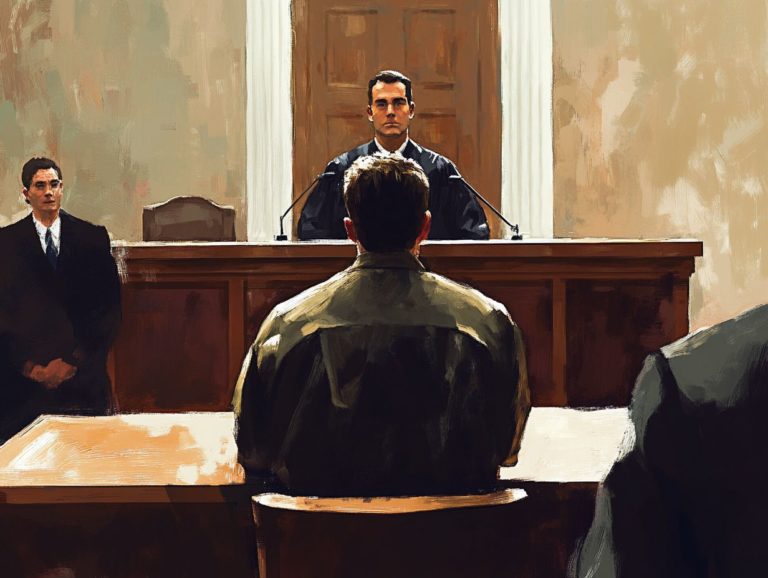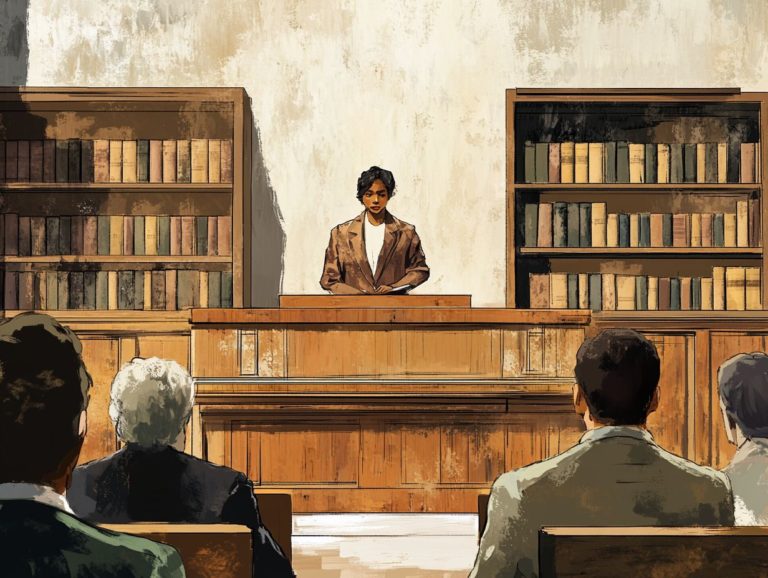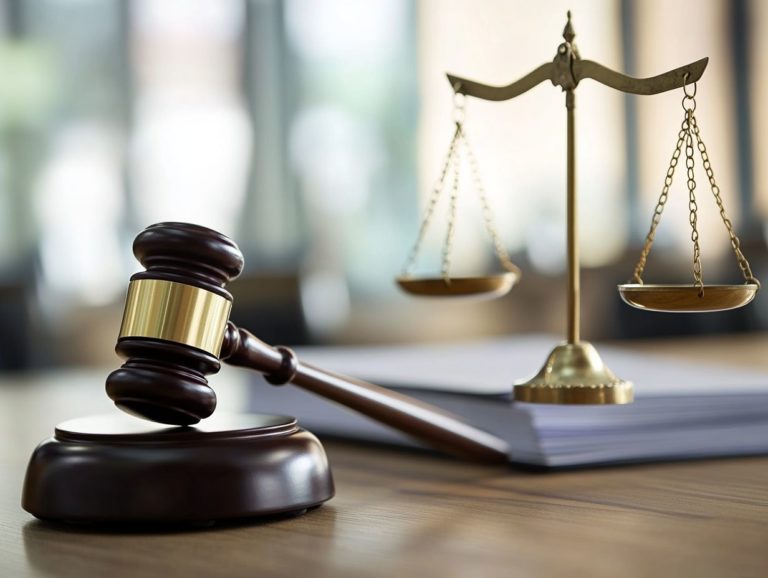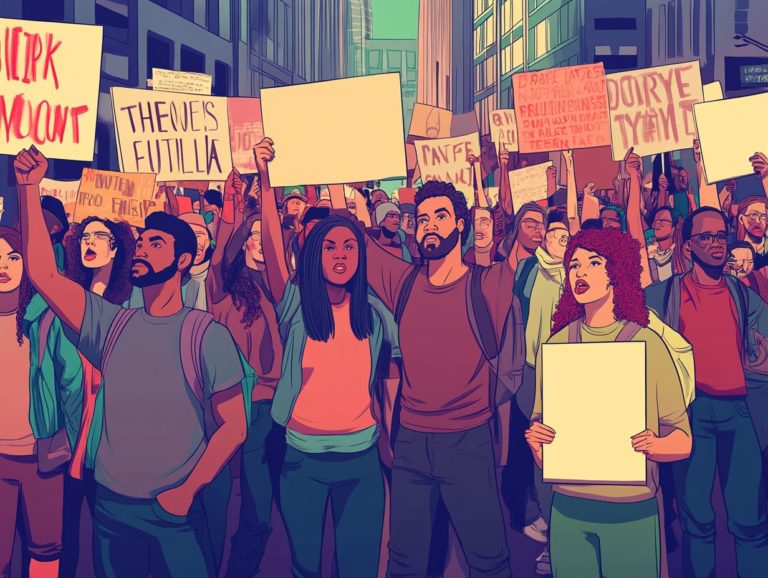Your Rights in Traffic Violations
Traffic violations are all too common and can carry serious implications for you and your driving record.
It s vital to understand the various types of violations, the consequences they bring, and your rights in these situations. This guide delves into the intricacies of traffic violations, covering everything from legal repercussions to your rights when contesting a ticket.
You ll discover how to construct a solid defense and navigate the legal system effectively, along with valuable tips for safe driving to help you avoid future infractions. Whether you re currently dealing with a violation or simply want to stay informed, this guide has everything you need.
Contents
- Key Takeaways:
- Understanding Traffic Violations
- Your Rights in Traffic Violations
- Defending Against Traffic Violations
- Navigating the Legal System
- Preventing Future Violations
- Frequently Asked Questions
- What are my rights in traffic violations?
- Do I have to pull over for a traffic stop?
- Can I refuse to take a breathalyzer or sobriety test?
- What should I do if I believe I am innocent of a traffic violation?
- What happens if I do not pay a traffic ticket?
- Can I negotiate a plea bargain for a traffic violation?
Key Takeaways:
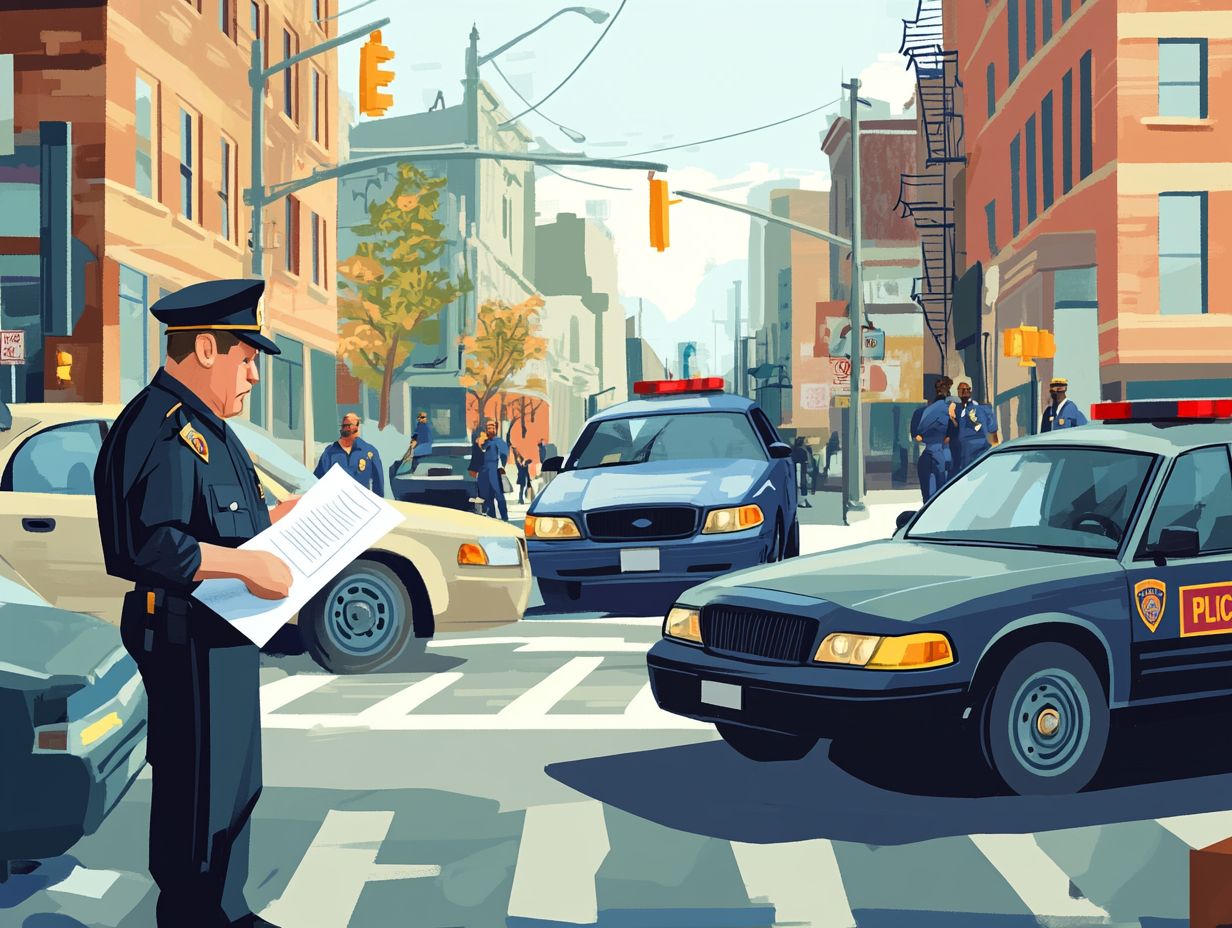
- Know the types and consequences of traffic violations.
- Exercise your right to legal representation.
- Gather evidence to build a strong defense.
- Understand court procedures to navigate the system.
- Practice safe driving to prevent future violations.
Understanding Traffic Violations
Understanding traffic violations is essential for drivers in North Carolina. These offenses can have serious repercussions that impact not just your driving record, but also your insurance rates, court appearances, and possible penalties.
Traffic violations cover a spectrum of offenses, from speeding to driving under the influence of alcohol or drugs (DUI). Each offense has its own set of consequences depending on its severity and nature. Being well-informed on how to navigate these violations can mean the difference between merely facing a fine and dealing with a criminal case.
That s why it s crucial for you to be prepared and knowledgeable about the legal processes involved.
Types of Traffic Violations
Traffic violations can be categorized into several types: minor infractions, waivable offenses, and serious criminal offenses. Each varies in severity and consequences. Common examples include speeding violations, failure to appear in court, or driving while impaired. Each can significantly impact your driving record and insurance premiums.
Understanding these categories is essential for navigating potential legal outcomes.
Minor infractions, such as parking tickets or neglecting to signal a lane change, typically result in fines or points on your record. You can often resolve minor infractions without going to court.
Waivable offenses, like certain traffic citations, offer a more convenient route; you can pay a fine and avoid court altogether, making the process smoother. Serious offenses, such as driving under the influence (DUI), come with hefty penalties and mandatory court appearances, putting your freedom and future insurance costs at greater risk.
By recognizing the differences among these violations, you can empower yourself to make informed decisions and effectively mitigate your liabilities.
Consequences of Traffic Violations
The consequences of traffic violations can be extensive, affecting your driving record, leading to penalty fees, and even impacting your insurance rates. Depending on the seriousness of the offense, you might find points added to your driving record, your insurance premiums rising, and in some instances, facing limited driving privileges or a complete suspension.
If you re a habitual offender, you could encounter even steeper penalties, such as mandatory driver education programs or community service obligations. The DMV monitors point accumulation closely, and surpassing certain thresholds can trigger automatic license suspensions or restrictions.
Serious infractions, like DUI or reckless driving, come with long-lasting repercussions that extend beyond financial implications. They can also affect your social standing, job opportunities, or professional licensing. Many individuals often underestimate the court costs tied to these violations, which can impose a significant financial strain in addition to rising insurance rates.
Your Rights in Traffic Violations
When you find yourself dealing with traffic violations in North Carolina, it’s essential to understand your rights.
You have the right to legal representation and the ability to contest any ticket in traffic court. These rights enable you to defend yourself against accusations that could affect both your driving record and your financial stability. Knowing your rights ensures you can navigate the legal system with the support you need.
Stay informed and drive safely to protect yourself and your record!
Right to Legal Representation
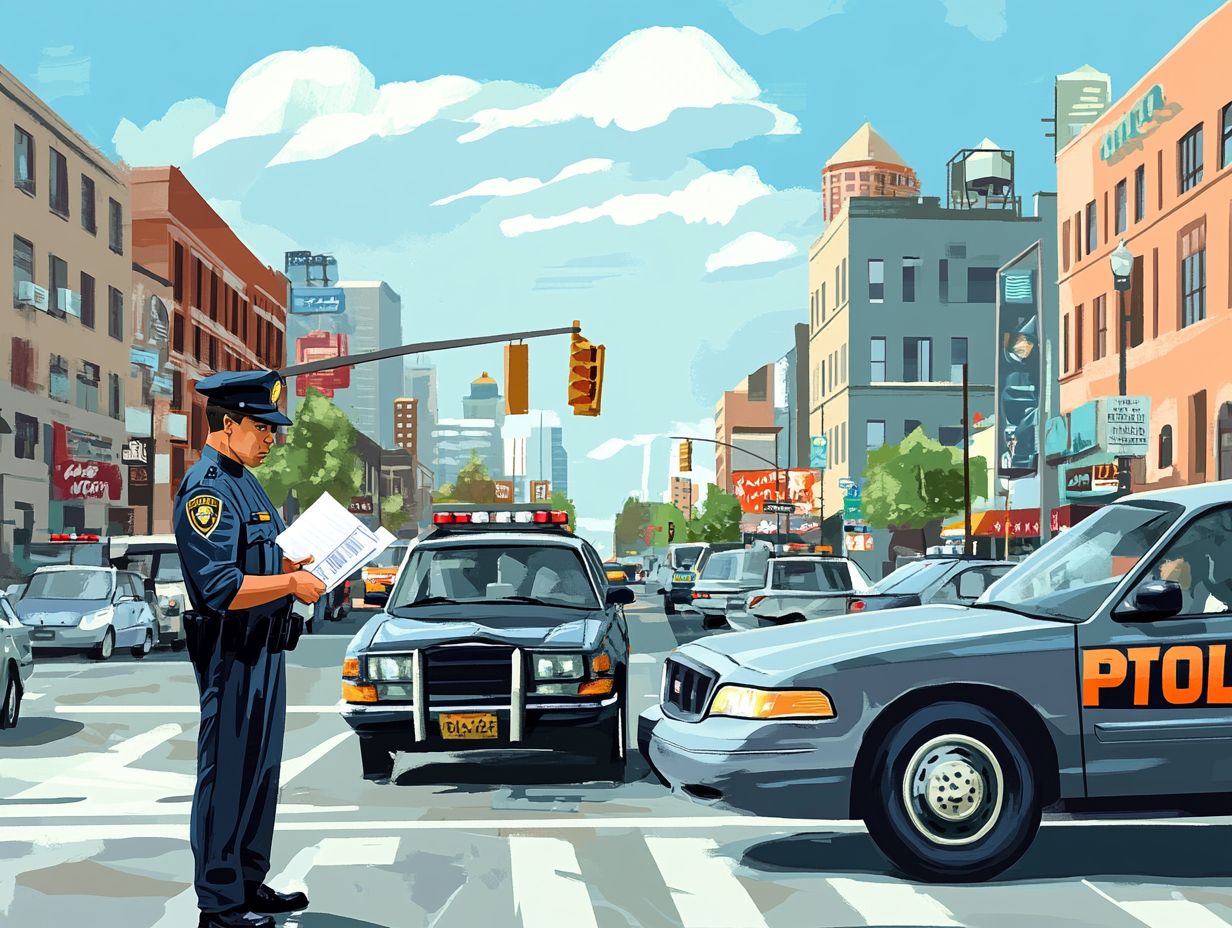
This right is crucial! You won t have to face traffic court alone. The right to legal representation allows you to have guidance from an experienced attorney who specializes in criminal defense. A skilled advocate will be by your side to help you build a strong case against the allegations you confront.
Engaging a qualified attorney can profoundly impact your situation. This is especially true for serious offenses like DUI (driving under the influence of alcohol or drugs) or reckless driving. These professionals provide invaluable legal insights, helping you understand the intricacies of your specific charge and the potential consequences that may follow.
An attorney can thoroughly examine the circumstances surrounding your violation. They may reveal inconsistencies or errors in the prosecution’s case. This expertise often leads to reduced penalties, alternatives to conviction, or even complete dismissal of charges.
With their support, the intimidating legal process becomes more manageable. You can approach your situation with greater confidence.
Right to Contest the Violation
One of your fundamental rights when facing traffic violations is the ability to contest a ticket. This allows you to challenge the charges through a formal hearing. The process ensures that all evidence is thoroughly considered and may lead to the waiving of penalties or a more favorable outcome in traffic court.
To navigate this effectively, grasp the steps involved. Start by gathering evidence, reviewing the citation details, and, if necessary, seeking legal advice.
Keep a close eye on court dates and deadlines for contesting the ticket. Missing these can lead to additional penalties, including fines or even a default judgment against you.
For certain minor violations, a waiver process might be available. This allows you to pay a reduced fine without stepping foot in court. While this can be convenient, be mindful that opting for a waiver could result in a conviction, potentially impacting your future driving privileges.
Defending Against Traffic Violations
Defending against traffic violations demands a strategic approach. This often involves carefully gathering evidence and constructing a robust defense.
This is particularly crucial when you re up against serious charges that could threaten your driving record and financial well-being. Collaborating with an attorney offers you the legal expertise needed to craft a compelling case, enabling you to effectively challenge the validity of the allegations against you.
Gathering Evidence
Gathering evidence is essential in defending against traffic violations. It helps establish the facts of your case and can potentially disprove the claims made by law enforcement.
This process involves collecting witness statements, photographs of the scene, and any other relevant documentation that can support your defense. Obtaining traffic camera footage, maintenance records for the involved vehicles, and expert opinions can further strengthen your case.
By collaborating with an attorney, you can navigate the complexities of evidence collection more efficiently. Attorneys are adept at identifying relevant evidence and knowing where to look for it, ensuring that no crucial detail slips through the cracks.
They can assist you in interviewing witnesses and gathering other critical materials in a manner that enhances your overall defense strategy. Ultimately, this aims for the best possible outcome in court.
Don t wait consult an attorney today to ensure you have the best chance of a favorable outcome!
Building a Strong Defense
Building a robust defense against traffic violations requires good knowledge of the law. An attorney s expertise becomes invaluable in this situation.
A skilled attorney can create a personalized strategy tailored to your unique situation. Their goal is to reduce penalties or even get the charges dismissed.
These legal professionals analyze the facts surrounding your incident, considering local statutes and potential defenses. They explore issues like lack of evidence or procedural errors that may have occurred during your arrest.
For example, if you re accused of speeding, your attorney might investigate whether the speed measuring device was properly calibrated. In DUI cases, examining the validity of field sobriety tests or the legal process that tracks evidence for blood samples could significantly influence the outcome.
A strong defense involves more than just legal knowledge; it’s about the strategic maneuvering required to safeguard your rights and ensure you receive a fair process.
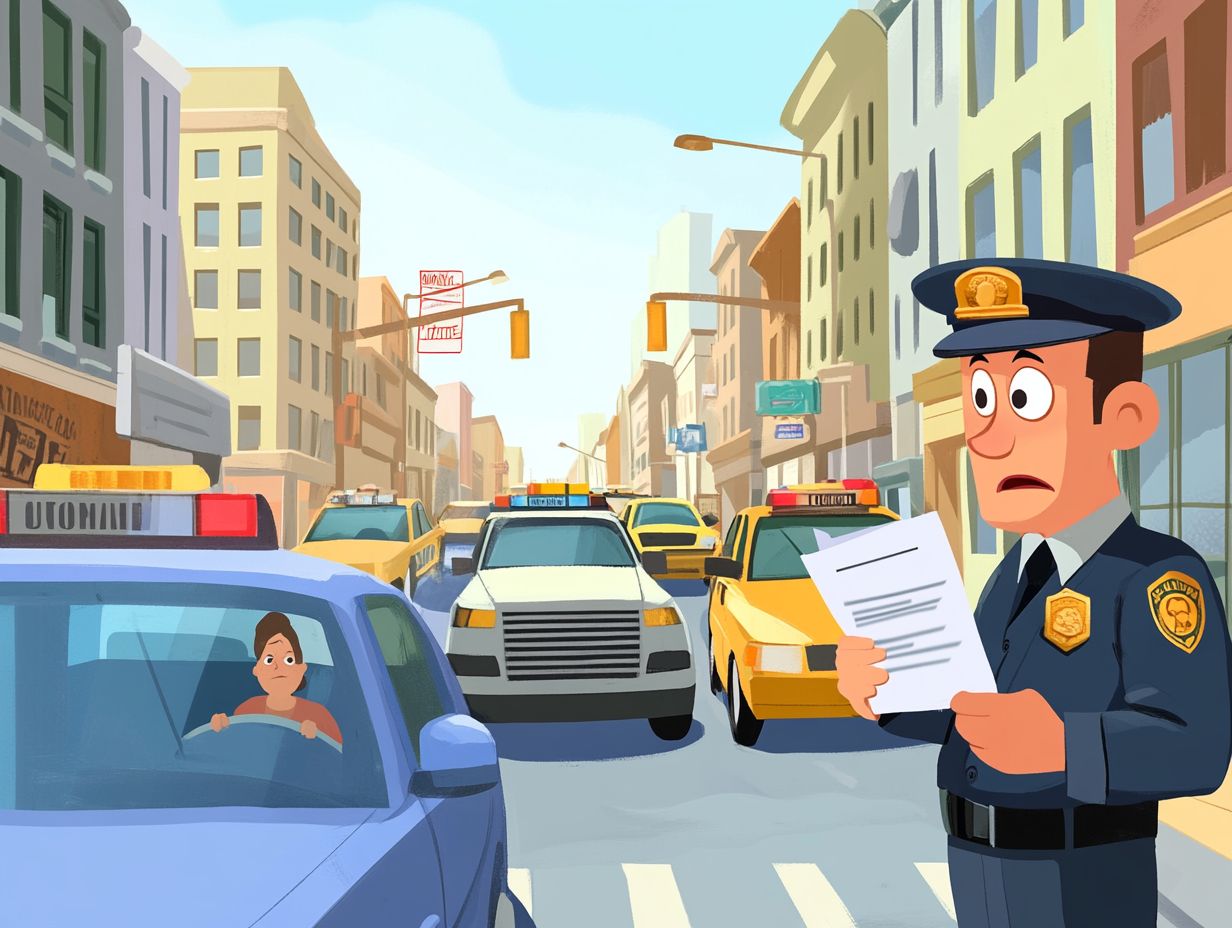
Navigating the legal system in the face of traffic violations can feel overwhelming. Familiarizing yourself with court procedures and the available options in North Carolina can significantly ease the experience.
Consider traffic school as a viable avenue for reducing penalties. Recognize the pivotal role the DMV plays in managing your driving record.
Understanding your rights is crucial for winning in traffic court!
Court Procedures and Options
Court procedures and options for handling traffic violations offer several paths: contesting a ticket, entering a plea, or pursuing the waiver process for specific offenses.
Each option carries its own set of implications for your driving record and penalties. It s crucial to understand the best course of action for your unique situation.
When you attend a hearing, expect a judge who will evaluate the evidence and listen to arguments from both parties. Depending on the nature of your violation, the available pleas guilty, not guilty, or no contest each come with distinct consequences.
Pleading guilty might entail immediate fines and points on your license. Contesting the ticket could lead to dismissal or reduced penalties if you present a compelling case. The waiver process allows eligible offenders to bypass a court appearance by simply paying a fine, but this route may also result in points on your driving record.
Given these factors, it s essential to weigh your decisions carefully, as they can profoundly affect the overall outcome of your case.
Preventing Future Violations
Preventing future traffic violations is essential for maintaining a pristine driving record and steering clear of associated penalties.
As a driver in North Carolina, you should adopt strategies for safe and responsible driving. Participating in traffic school can also be incredibly beneficial, offering valuable insights that equip you with the skills needed to navigate the roads safely and sidestep potential infractions.
Tips for Safe and Responsible Driving
- Obey speed limits.
- Avoid distractions.
- Be mindful of road conditions.
- Incorporate defensive driving techniques to anticipate and respond to the unexpected actions of others.
- Understand road signs and signals for navigation and compliance.
- Regularly maintain your vehicle by checking tire pressure, brakes, and fluid levels.
By implementing these practices, you’re fostering a culture of responsibility that can ultimately decrease traffic violations and enhance overall safety for everyone on the road.
Frequently Asked Questions
For more information or personalized legal advice, consider consulting an attorney specializing in traffic violations.
What are my rights in traffic violations?
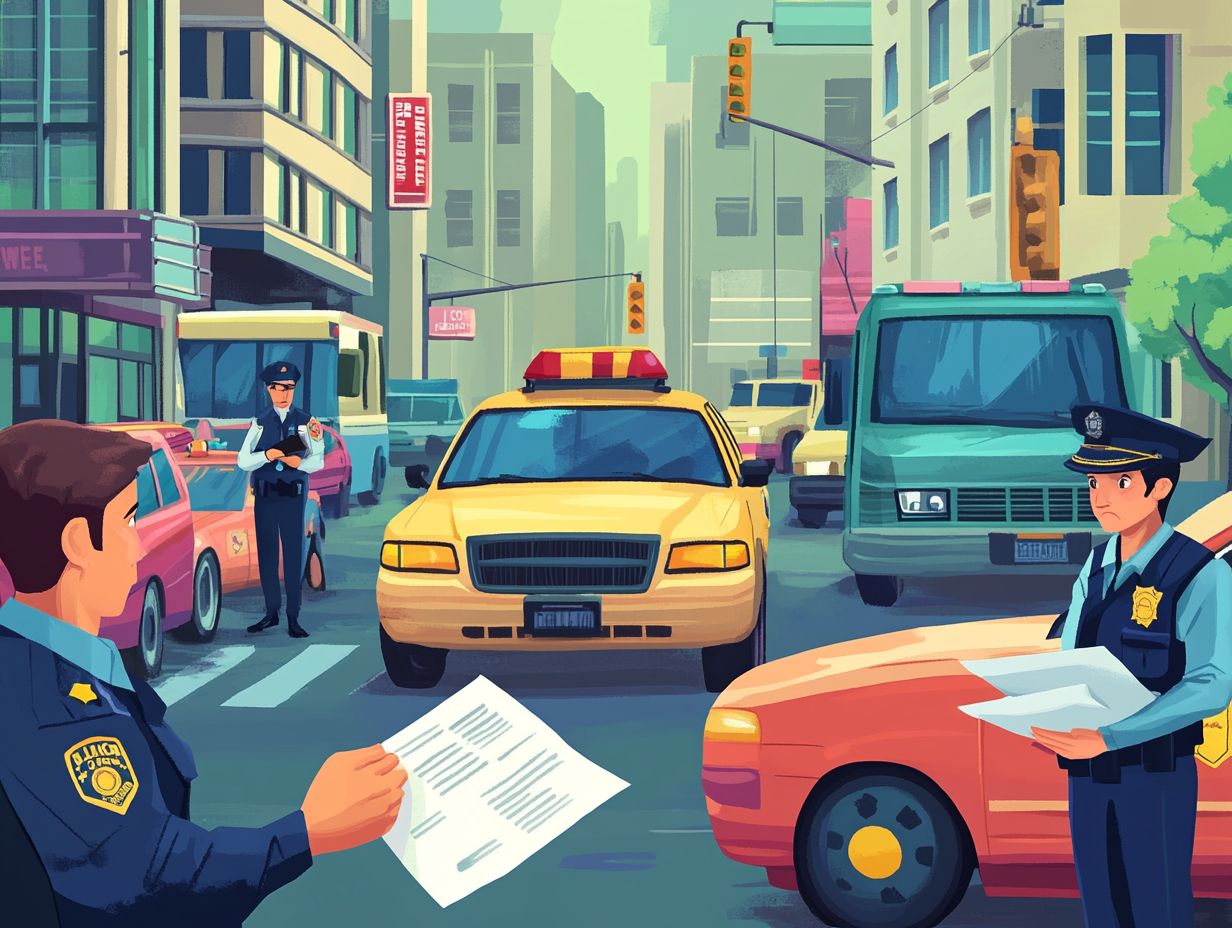
As a driver, you have rights protected by law during traffic violations. This includes the right to a fair hearing, to remain silent, and to have a lawyer.
Do I have to pull over for a traffic stop?
Yes, you must pull over for law enforcement when signaled. Not doing so can lead to extra charges and penalties.
Can I refuse to take a breathalyzer or sobriety test?
You can often refuse a breathalyzer or sobriety test. But keep in mind, doing so may lead to automatic license suspension and could be used against you in court.
What should I do if I believe I am innocent of a traffic violation?
If you believe you are innocent, you can contest the citation in court. Gather any evidence or witnesses, and consider consulting a lawyer for guidance.
What happens if I do not pay a traffic ticket?
Not paying a traffic ticket may lead to higher fines, license suspension, or even an arrest warrant. It’s crucial to handle traffic violations promptly to avoid these issues.
Can I negotiate a plea bargain for a traffic violation?
You might be able to negotiate a plea bargain for lower charges or penalties. Consult a lawyer to explore your options and find the best action for your situation.



